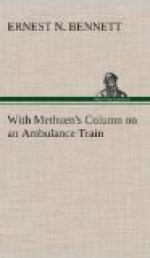As we steamed into Modder River station the 4.7 gun called “Joe Chamberlain” loosed off a Lyddite shell at the Magersfontein trenches. Some desultory shelling continued on both sides at 7,000 yards, chiefly in the early morning and evening—a kind of “good day” and “good night” exchanged between “Joe Chamberlain” and “Long Tom,”. During our stay on this occasion some excellent practice was made on both sides. On the 26th a shell from our gun struck a Boer water-cask and smashed it to bits; next day a Boer shell fell plump into a party of Lancers and killed four horses. On another occasion more than fifty shells—so I heard—fell round the 4.7 gun, and although the gunners were compelled to seek cover the gun was absolutely uninjured.
Apart from this interchange of artillery fire the camp was undisturbed. The trenches were of course manned day and night, but spare time was filled up to some extent by various games. Goal posts were visible here and there, and Lord Methuen had offered a challenge cup for “soccer” football, the ties of which were being keenly contested.
We took on board a fresh load of sick and wounded men—chiefly the former—bound for Wynberg hospital. Just before we left I walked a hundred yards from the line and saw the graves of Colonel Downman, Lieutenant Campbell, Lieutenant Fox, and a Swede called, I think, Olaf Nilsen. The graves were marked by simple wooden crosses: those who were enemies in life lay side by side in the gentle keeping of Death, the Healer of Strife, for so the Greeks of old time loved to call him.
Soon after leaving the Modder the sky grew black with clouds, the birds hid themselves from view and the veldt-cricket ceased from his monotonous chirrup. Then all at once the storm burst upon us. The lightning played incessantly and sheets of rain blotted out the kopjes and the veldt from view. It was in weather like this that our poor fellows advanced through the darkness upon the Magersfontein trenches!
At Orange River we halted for some time, and somebody suggested a snake hunt in the scrub, but no one seemed very keen about this form of sport. The “ringhals” in the veldt are very deadly. I remember speaking to a Kaffir about them and asking him if he had known of any fatal bites. He replied, pathetically enough: “Yes, sah, a brudder of me—two hours, he was dead—mudder and sister and me was there”.
Near Enslin a most unhappy accident had occurred. A sentry of the Shropshire had seen two figures advancing in the evening towards his post, had challenged, and, failing to get the prescribed reply, had fired off seven bullets into the two supposed Boers, who turned out to be a sergeant and private of his own regiment. By a miracle both these wounded men ultimately recovered, but while we were at Enslin we heard that the poor sentry was absolutely prostrated by grief and horror over the unfortunate affair.




